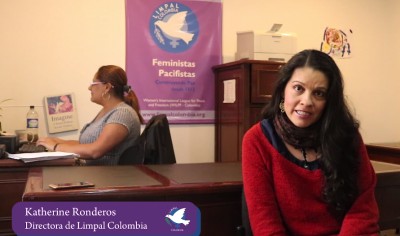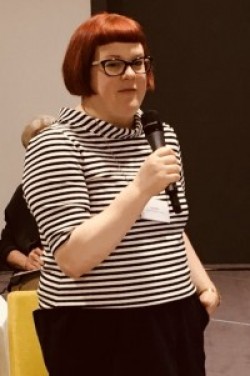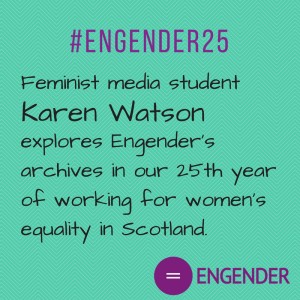Engender blog
CEDAW: How the UN Women’s Bill of Rights creates possibilities for women and girls in Scotland.
Engender members and other people who stay in touch with our work will know that we have been enabling organisations that care about women’s and girls’ equality to shadow the UN CEDAW process. The International Bill of Rights for Women is a key global human rights instrument for gender equality. The UK Government has just been examined by its dedicated UN CEDAW Committee to see how well the rights it provides for are being realised across the four nations of the UK.
We’ve written about the process, what happened during the examination, and annotated the concluding observations (or recommendations) that the Committee makes to UK Government. Here we’re going to summarise four of our reflections from the experience of working on CEDAW over the past two years.
GUEST POST: Abortion Legislation in Latin America
Belén González Leggire is an Uruguayan journalist with a master's degree in gender studies and public policy. She was born in Montevideo, and is been living in Edinburgh since 2017. The topics she has investigated over the past years have included sexual violence against women during military coups and the design of social care services in Europe and South America. She is a member of WomenBeing, a research network for the promotion of gender studies.
Here, she writes about abortion legislation in Latin America, where women can be sent to prison for illegally terminating a pregnancy or even for suffering a spontaneous miscarriage.
-400.png)
2018 was yet another year with much to think about for the feminist. In May, Ireland finally repealed the Eighth Amendment, a subsection of their 1983 Constitution that gave the equal right to life of the pregnant woman and the fetus. This cruel law has made termination illegal in the country for the last 35 years. Simultaneously, in South America, Argentina had the chance to join the small group of countries in the region which legalise abortion. Unfortunately, this did not happen. And despite the “#EleNão” (#NotHim) campaign - a social media movement of women rallying against inequality and the election of Far Right a presidential candidate - Jair Bolsonaro won the elections in Brazil, resulting in the country giving the far right more power in the region as a whole.
Abortion Rights in Colombia

This week we hosted an event exploring abortion rights around the world, as part of the Edinburgh World Justice Festival. At this event, we were really pleased to be able to share this short video from sisters in Colombia working for abortion rights.
The video was made as a result of the work of Anne Scott (1951 - 2018), who was a long-term member of Engender, of Abortion Rights Edinburgh, and of the Women's International League for Peace and Freedom (WILPF). Anne had been in contact with WILPF in Colombia and asked them to produce an article discussing the situation there. The article, discussing really exciting community initiatives for abortion rights, can be accessed here.
The article and video is a fitting tribute to Anne, who is much missed by us all.
European Women's Forum: For a feminist Europe

Earlier this summer our Executive Director Emma Ritch attended the General Assembly of the European Women's Lobby in Brussels. Here she writes on the role and structure of the Lobby, and how Engender works with our sisters in Europe.
In June, I spent most of a week at the European Women's Lobby general assembly in Brussels, where I was elected to its board of administration.
The Lobby is the largest European umbrella of women's organisations, and its general assembly is an annual gathering of all of the national co-ordinations. Engender represents Scotland within the Lobby.
Some of you who follow European feminism or institutional feminist politics will have seen the Lobby pop up on Twitter, in our Friday Feminist Five mailers, but their work is much less familiar to other feminists in Scotland.
I thought I'd share five things about the Lobby (and Engender's involvement with it) that might be of interest.
#Engender25: Spotlight on Engender's international connections

Engender is working with the University of Stirling to host student Karen Watson who will be exploring Engender's archives as we celebrate our 25th Anniversary.
In Karen's third blog, she highlights some correspondence found in the archives that looks at women's rights and equality internationally.
Downloads
 Engender Briefing: Pension Credit Entitlement Changes
From 15 May 2019, new changes will be introduced which will require couples where one partner has reached state pension age and one has not (‘mixed age couples’) to claim universal credit (UC) instead of Pension Credit.
Engender Briefing: Pension Credit Entitlement Changes
From 15 May 2019, new changes will be introduced which will require couples where one partner has reached state pension age and one has not (‘mixed age couples’) to claim universal credit (UC) instead of Pension Credit.
 Engender Parliamentary Briefing: Condemnation of Misogyny, Racism, Harassment and Sexism
Engender welcomes this Scottish Parliament Debate on Condemnation of Misogyny, Racism, Harassment and Sexism and the opportunity to raise awareness of the ways in which women in Scotland’s inequality contributes to gender-based violence.
Engender Parliamentary Briefing: Condemnation of Misogyny, Racism, Harassment and Sexism
Engender welcomes this Scottish Parliament Debate on Condemnation of Misogyny, Racism, Harassment and Sexism and the opportunity to raise awareness of the ways in which women in Scotland’s inequality contributes to gender-based violence.
 Gender Matters in Social Security: Individual Payments of Universal Credit
A paper calling on the Scottish Government to automatically split payments of Universal Credit between couples, once this power is devolved to the Scottish Parliament.
Gender Matters in Social Security: Individual Payments of Universal Credit
A paper calling on the Scottish Government to automatically split payments of Universal Credit between couples, once this power is devolved to the Scottish Parliament.
 Gender Matters Manifesto: Twenty for 2016
This manifesto sets out measures that, with political will, can be taken over the next parliamentary term in pursuit of these goals.
Gender Matters Manifesto: Twenty for 2016
This manifesto sets out measures that, with political will, can be taken over the next parliamentary term in pursuit of these goals.
 Scottish NGO Briefing for UN Special Rapporteur on Violence Against Women
Joint briefing paper for the UN Rapporteur on Violence Against Women.
Scottish NGO Briefing for UN Special Rapporteur on Violence Against Women
Joint briefing paper for the UN Rapporteur on Violence Against Women.

Newsletter
Sign up to receive our newsletter here:
Sign up to our mailing list
Receive key feminist updates direct to your inbox: